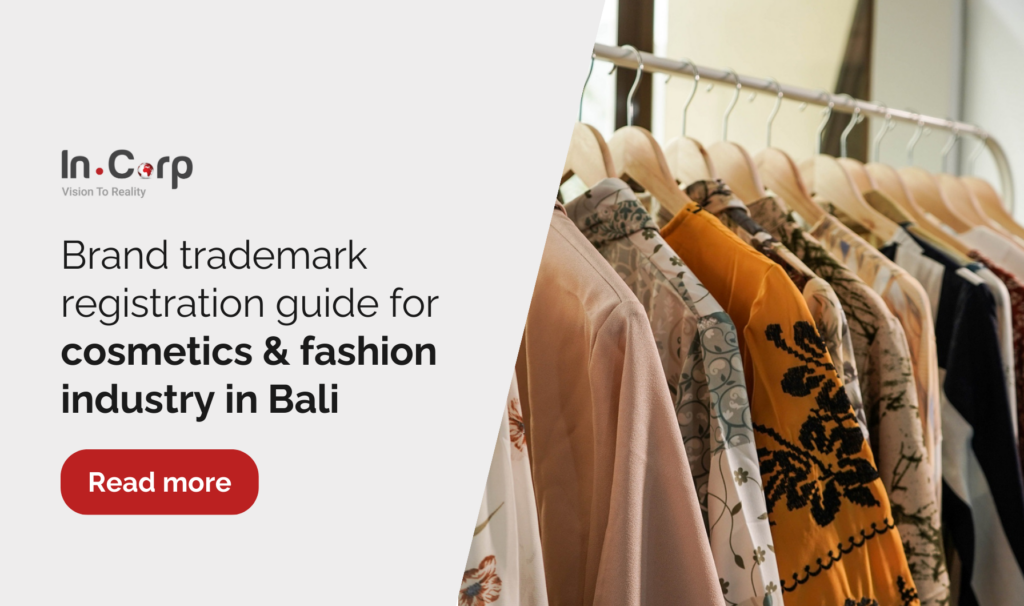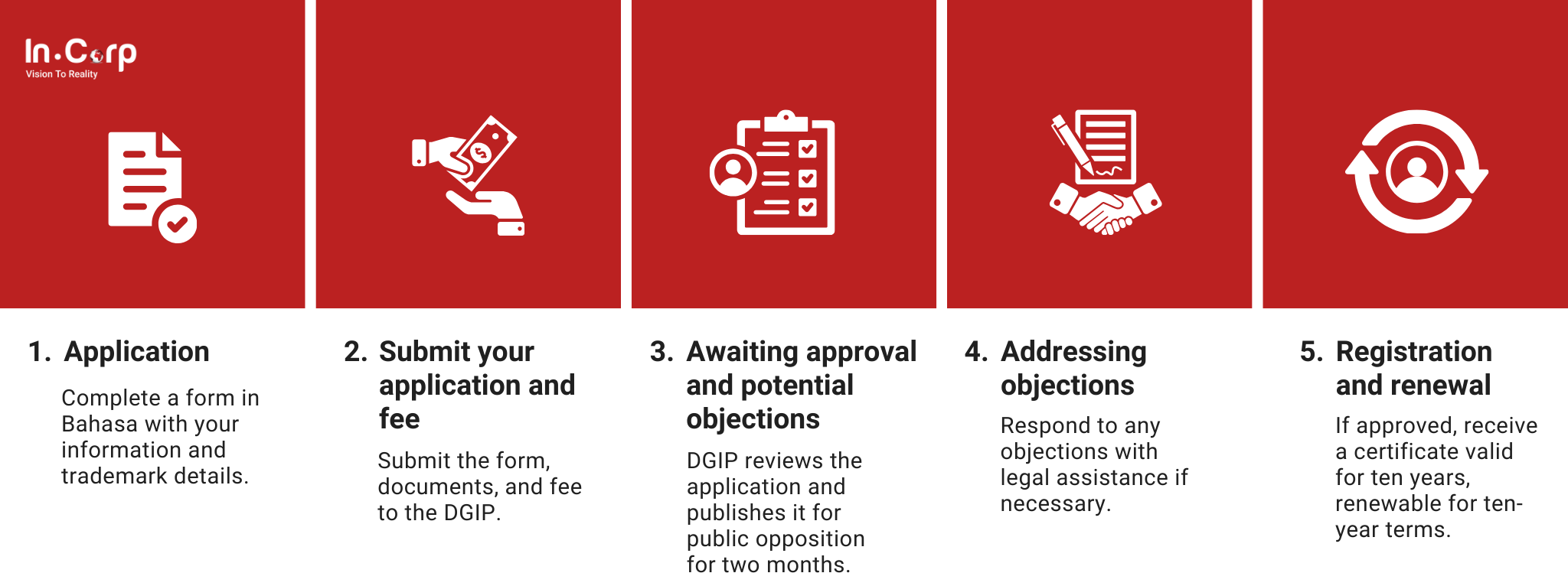Branding is basically the foundation of your company identity, especially in the fashion and cosmetics industry. Therefore, protecting your branding with brand trademark registration is important for your business.
If your company is based in Bali, the fashion and cosmetics sectors have many players. Registering your brand trademark can be a strategic measure to stay on top of your audience’s mind and ensure compliance.
That being said, understanding trademark registration is paramount for businesses setting sail in the alluring waters of Bali. This article will assist you in securing your brand trademark in Bali and ensure your unique identity makes a splash in this vibrant market.
Overview of the cosmetics and fashion industries in Bali
Bali is one of the regions in Indonesia that dominate the creative industry nationwide. The fashion industry, which also needs creativity, is rapidly expanding on the island. This positive trend helps indonesia for making it as one of the largest and fastest-growing in the world in the fashion industry.
To have a closer look at this trend, here are several factors contribute to this growth:
- A large and expanding middle class with increased disposable income
- A young, fashion-conscious population
- The rise of e-commerce
- The ever-increasing global popularity of Indonesian fashion brands
By 2023, the fashion market in Indonesia is expected to reach USD 6.02 billion, with a steady growth rate of 5.22% annually over the next five years. While for Bali, it excels in the fashion industry, offering more than just style and comfort. The unique craftsmanship of Balinese artisans distinguishes it from other fashion styles.
Bali’s fashion scene integrates the island’s rich heritage, using local materials like stones, woods, metals, leather, and fabrics. Balinese fashion successfully adapts to modern trends while maintaining its traditional roots.
Moreover, Bali’s cosmetic and aesthetic procedures are booming due to qualified practitioners and lower prices than in Malaysia and Singapore. The Indonesian Ministry of Tourism and Creative Economy reports that Bali has over 200 beauty clinics, spas, and aesthetic centers offering a range of treatments.
What is brand and trademark registration?
As a business owner, you can independently register your brand trademark in Indonesia, but it is crucial to consider compliance. The process is governed by Law No. 11/2020, specifically Job Creation Article 108.
The Directorate General of Intellectual Property Rights, part of the Ministry of Law and Human Rights, enforces this law to protect a broader range of trademarks and speed up the registration process.
Despite the streamlined application process, specific requirements must be met, and applicants should know the time needed to complete it. Using trademark registration services in Indonesia can allow you to concentrate more on your business operations.
Read more: A comprehensive guide to trademark registration in Indonesia
Types of trademark registration
The trademark law encompasses both conventional and unconventional trademarks. Conventional trademarks are the most commonly recognized types in the market.
Conversely, unconventional trademarks differ from traditional marks and can be harder to register. These include visible and non-visible marks, which may require more detailed descriptions during the application process.
Trademark law protects a wide range of elements that identify a brand and distinguish it from competitors. Understanding these categories is crucial for safeguarding your brand identity. Let’s delve into the two main types of trademark registration:
Type of trademark
The classification system analyzes and categorizes trademarks based on their specific elements and characteristics.
|
Conventional Trademarks |
||
| Category | Description | Examples |
| Word marks | Comprised solely of words or letters, these can be brand names, slogans, or even taglines. | Adidas, Apple, FedEx |
| Logos | Visual symbols represent a brand, often incorporating design elements, words, or both. | Nike swoosh, Apple logo, Lacoste crocodile |
| Names | These can encompass brand names, product names, or even character names associated with a brand. | Mickey Mouse, Coca-Cola |
|
Unconventional Trademarks |
||
| Sound marks | Distinctive sounds associated with a brand are often used in jingles or commercials. | MGM lion’s roar, Intel bong sound |
| Scent marks | While uncommon, pleasant, or distinctive smells associated with a brand can be trademarked. | Play-Doh’s unique scent |
| Color marks | A particular color combination can be trademarked in industries where color plays a significant role. | Tiffany & Co. blue, Cadbury purple |
| Shape marks | Protect unique product designs or packaging shapes that distinguish a brand. | The Coca-Cola bottle shape, Lego brick |
| Taste marks | It is less common but possible to file a trademark for a unique and identifiable taste associated with a product. | Coca-Cola’s secret formula taste |
| Texture marks | The specific texture of a product can be protected if it’s a distinctive brand characteristic. | The ribbed sole of Stila Stay-All Day Liquid Lipstick |
| Holographic marks | Three-dimensional holograms used in branding can also be registered as trademarks. | Certain security features on credit cards |
Legal standpoint
Trademark protection specifies the geographical area in which the trademark is legally safeguarded.
| Category | Description | Examples |
| National trademark | Registered with a national trademark office, granting protection within that country. | USPTO in the United States |
| Regional trademark | Registered with a regional trademark office, protecting the brand in multiple countries within a specific region. | European Union Trademark (EUTM) |
| International trademark | Registered through an international treaty like the Madrid Protocol, which simultaneously offers protection in many countries. | Madrid International Trademark System |
The benefits of trademarking your brand in Bali
Given the prevalence of piracy in Bali, it is essential to register your goods and services with a trademark. By doing so, you can enjoy several significant benefits:
- The company receives exclusive protection against infringement claims by others.
- The trademark owner gains legal support in case of disputes.
- According to Trademark Act No. 15 of 2001, priority is given to the person or entity that first files the trademark application.
- A strong and reputable trademark enhances the value of products or services, helping the company connect better with potential customers.
What are some examples of fashion and cosmetic trademark brands?
Fashion and cosmetic trademarks encompass diverse forms, each safeguarding a brand’s unique identity. Here are some examples:
|
Fashion Trademarks |
|
| Type of Trademark | Examples |
| Company names |
|
| Logos |
|
| Designs |
|
| Slogans |
|
|
Cosmetic Trademarks |
|
| Company names |
|
| Product names |
|
| Packaging design |
|
| Slogans |
|
Steps to trademark your brand in Bali
Expanding your fashion and cosmetic business to Bali offers exciting opportunities, but protecting your brand trademark is crucial. Here’s a step-by-step guide to trademark registration in Bali:
Application
Complete the application form in Bahasa detailing your information and the trademark (logo, slogan, etc.) you want to register, including any specific colors. Partnering with a local intellectual property (IP) specialist can help ensure accuracy. Have your full name, address, nationality, and a transparent digital trademark file ready.
Submit your application and fee
Submit the completed form, required documents, and registration cost to the Directorate General of Intellectual Property (DGIP). Fees vary, so consult your IP specialist for specifics.
Awaiting approval and potential objections
The DGIP will review your application for completeness and conflicts with existing trademarks, typically within 15 working days. If it passes, the application is published for public opposition for about two months, during which others can object if they believe your trademark infringes on their rights.
Addressing objections
If objections arise, you can respond and defend your application, which may involve legal consultations. Your IP consultant can assist you through this process.
Registration and renewal
If there are no objections or you successfully address them, the DGIP will issue a trademark registration certificate, valid for ten years and renewable for additional ten-year terms.
Trademark your brand with InCorp
Unleash your brand’s potential in Bali’s thriving fashion and cosmetics scene. This captivating island paradise offers a vibrant market and surging consumer demand, creating a launchpad for your brand’s success.
To help you navigate this promising landscape, InCorp Indonesia can simplify your entry with expert trademark registration services tailored to the cosmetics and beauty industry and seamlessly register your product.
We’ll guide you through local market nuances, legal requirements, and corporate regulations, ensuring a solid foundation for your brand’s flourishing in Bali. Click the button below to start your brand legacy in Bali.
Get in touch with us.
What you'll get
A prompt response to your inquiry
Knowledge for doing business from local experts
Ongoing support for your business
Disclaimer
The information is provided by PT. Cekindo Business International (“InCorp Indonesia/ we”) for general purpose only and we make no representations or warranties of any kind.
We do not act as an authorized government or non-government provider for official documents and services, which is issued by the Government of the Republic of Indonesia or its appointed officials. We do not promote any official government document or services of the Government of the Republic of Indonesia, including but not limited to, business identifiers, health and welfare assistance programs and benefits, unclaimed tax rebate, electronic travel visa and authorization, passports in this website.




